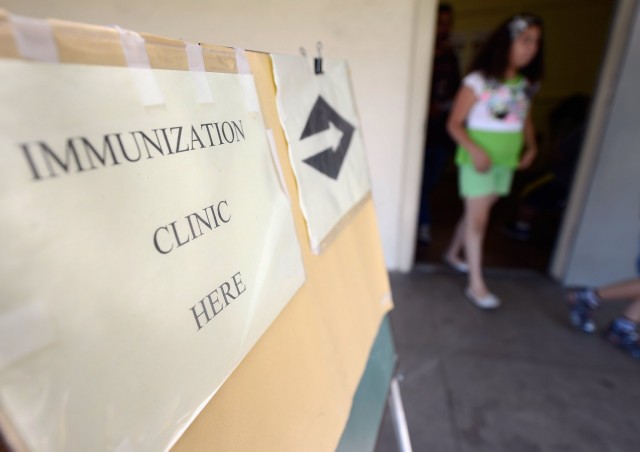It's pretty easy to imagine that people who are ardently opposed to vaccinating their children are also going to be ardently opposed to a law that removes their personal choice.
Tightening Rules
"Rather than eliminating choice," Nyhan says, "we alter the administrative procedures to reflect the cost that going unvaccinated affects the community."
Those administrative procedures have to do with tightening the rules around how people can obtain an exemption from vaccination.
Backing up for a moment, California is one of 20 states that permits a philosophical exemption from vaccines. In addition, all states, except two, permit a religious exemption. Only West Virginia and Mississippi require all children to be vaccinated, except those who cannot be immunized for a medical reasons.
Until this school year, it was easier in California to opt out of vaccines than it was to vaccinate your children. While it's state law that all kindergartners be vaccinated to attend any school statewide -- public, private or religious -- parents could opt out simply by writing a short statement declaring that they opposed vaccines.
With this school year, parents now must meet first with a health care provider, who must attest that the parents have been provided with information about vaccines and vaccine-preventable illness. Right away, the rate of personal belief exemptions dropped by 19 percent statewide.
"The educational requirement can be a significant step in getting people to choose to have their children vaccinated," Ross Silverman, a professor of public health law at Indiana University, told me. "The decision to have these exemptions at all is a purely political one."
While public health agencies have the power to require vaccination, he said, "you want to strike the balance with protecting the public's health against being seen as too forceful."
He wrote recently in JAMA about different legislative tools to limit non-medical vaccine exemptions, including options that California has not pursued:
- Requiring annual renewal of the personal belief exemption. Right now, parents need only file at kindergarten and seventh grade
- Require notarization to file the personal belief exemption form
- For religious exemptions, require a religious leader within the organization to submit a letter on your behalf
The state with the best "evidence-driven structure" for a philosophical exemption, Silverman said, is Arkansas, which has all three policies above in place.
Arkansas' exemption rate in the 2013-2014 school year was 1.2 percent, versus California's 3.3 percent that year.
Meanwhile, Oregon has only a religious exemption, and its rate in 2013-2014 was 7.1 percent. That's among the highest exemption rates in the country, Silverman says, "and they don't even have a philosophical exemption."
In addition to strict rules about obtaining an exemption, the other opportunity to increase vaccination has to do with messaging around vaccines. Simply spreading straightforward public health information is not effective -- and may even be counterproductive -- for some people already hesitant about vaccines, Nyhan reported in a famous study last year.
But he recommends other approaches to improving vaccination rates. He cited a campaign in a community in Western Australia that focuses on values, not science, shared by community members. One photo shows a dad, "Andrew," carrying a baby in a sling, with the message "I use cloth nappies, I eat whole foods, and I immunise."
It's a powerful message, and it "communicate(s) that you share the values and backgrounds of the people exempting," Nyhan said.
Nyhan also worries that the media focus on people who refuse vaccines may create a false impression that those views are mainstream. Even in California, measles outbreak and all, only 2.5 percent of kindergartners this year had a non-medical exemption. Put a different way, more than 97 percent of California parents vaccinate their kids.
